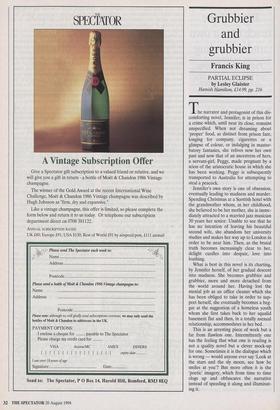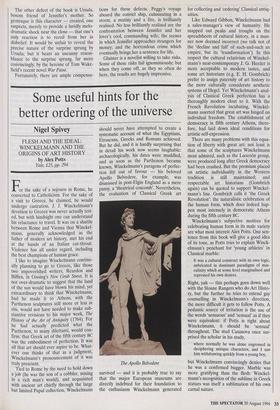Grubbier and grubbier
Francis King
PARTIAL ECLIPSE by Lesley Glaister Hamish Hamilton, £14.99, pp. 216 The narrator and protagonist of this dis- comforting novel, Jennifer, is in prison for a crime which, until near its close, remains unspecified. When not dreaming about `proper' food, as distinct from prison fare, longing for company, cigarettes or a glimpse of colour, or indulging in mastur- batory fantasies, she relives now her own past and now that of an ancestress of hers, a servant-girl, Peggy, made pregnant by a scion of the aristocratic house in which she has been working. Peggy is subsequently transported to Australia for attempting to steal a peacock.
Jennifer's own story is one of obsession, eventually leading to madness and murder. Spending Christmas at a Scottish hotel with the grandmother whom, in her childhood, she believed to be her mother, she is imme- diately attracted to a married jazz musician 30 years her senior. Unable to see that he has no intention of leaving his beautiful second wife, she abandons her university studies and makes her way up to London in order to be near him. Then, as the brutal truth becomes increasingly clear to her, delight curdles into despair, love into loathing.
What is best in this novel is its charting, by Jennifer herself, of her gradual descent into madness. She becomes grubbier and grubbier, more and more detached from the world around her. Having lost the menial job as an office cleaner which she has been obliged to take in order to sup- port herself, she eventually becomes a beg- gar at the suggestion of a homeless youth whom she first takes back to her squalid basement flat and then, in a totally asexual relationship, accommodates in her bed.
This is an arresting piece of work but a far from flawless one. Intermittently one has the feeling that what one is reading is not a quality novel but a clever mock-up for one. Sometimes it is the dialogue which is wrong — would anyone ever say 'Look at the stars and the sly moon, see how he smiles at you'? But more often it is the `poetic' imagery, which from time to time clogs up and obfuscates the narrative instead of speeding it along and illuminat- ing it. The other defect of the book is Ursula, bosom friend of Jennifer's mother. So grotesque is this character — created, one suspects, merely to provide a luridly melo- dramatic shock near the close — that one's only reaction is to recoil from her in disbelief. It would be unfair to reveal the precise nature of the surprise sprung by Ursula; but it bears an uncanny resem- blance to the surprise sprung, far more convincingly, by the heroine of Tom Wake- field's recent novel War Paint.
Fortunately, there are ample compensa- tions for these defects. Peggy's voyage aboard the convict ship, culminating in a storm, a mutiny and a fire, is brilliantly realised. No less brilliantly realised are the confrontation between Jennifer and her lover's cool, commanding wife; the scenes in which Jennifer approaches strangers for money; and the horrendous crime which eventually brings her a sentence for life.
Glaister is a novelist willing to take risks. Some of these risks fail ignominiously; but when they come off, as they so often do here, the results are hugely impressive.



















































 Previous page
Previous page